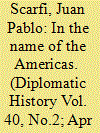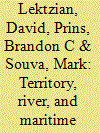|
|
|
Sort Order |
|
|
|
Items / Page
|
|
|
|
|
|
|
| Srl | Item |
| 1 |
ID:
158306


|
|
|
|
|
| Publication |
New York, Harcourt, Brace and Company, 1944.
|
| Description |
ix, 66p.hbk
|
| Contents |
(B)
|
|
|
|
|
|
|
|
|
|
|
|
Copies: C:1/I:0,R:0,Q:0
Circulation
| Accession# | Call# | Current Location | Status | Policy | Location |
| 059373 | 320.1/SPY 059373 | Main | On Shelf | General | |
|
|
|
|
| 2 |
ID:
145213


|
|
|
|
|
| Summary/Abstract |
The historiography of the Monroe Doctrine has tended to concentrate on nineteenth century interpretations, as proposed by U.S. politicians. More importantly, Latin American interpretations of the doctrine have been overlooked. This article explores the hemispheric intellectual history of the doctrine in the U.S., Argentina, Brazil, Chile, and Uruguay, examining its re-interpretation by Latin American jurists and politicians, such as Luis María Drago, Alejandro Álvarez and Baltasar Brum, and the reactions it provoked in the U.S. in the context of the emergence of the modern version of Pan-Americanism (1889) and a continental approach to international law. It argues that by re-interpreting the Monroe Doctrine as a Pan-American principle, these Latin American figures contributed in turn to redefining U.S. hemispheric hegemony along the lines of multilateralism and non-intervention. However, U.S. politicians and jurists were for the most part reluctant to renounce U.S. unilateral aspirations and interventionism on the continent until 1933.
|
|
|
|
|
|
|
|
|
|
|
|
|
|
|
|
| 3 |
ID:
088128


|
|
|
|
|
| Publication |
2009.
|
| Summary/Abstract |
The adoption of the Inter-American Democratic Charter by the Organization of American States in 2001 proclaiming the right to democracy in the western hemisphere was hailed by many as a landmark development. Since then, however, constitutionally dubious transitions of democratically elected governments were attempted or took place in Venezuela, Haiti, and Ecuador. This paper examines whether the Charter can and should serve as the institutional guarantor of democratic legitimacy in the Americas. Its conclusions are skeptical. As an external instrument, the Charter is bound to have limited impact when government control or authority is subjected to significant domestic disruptions. The Charter's limitations do not lie with the document itself; rather they are inherent in the structure of the international states system. But the Charter's normative basis would be problematic even if these structural limitations did not exist. Taking its cue from the classical liberal approach to international relations, the paper argues that democracy must ultimately be the choice and responsibility of those who live within its bounds, and not of outside governments or institutions.
|
|
|
|
|
|
|
|
|
|
|
|
|
|
|
|
| 4 |
ID:
161733


|
|
|
| 5 |
ID:
101619


|
|
|
|
|
| Publication |
2010.
|
| Summary/Abstract |
Issues remain at the core of armed conflict. Territory, in particular, appears to increase substantially the probability of inter-state violence and is concluded by many to be one of the most critical correlates of war onset. While scholars have called for an issue-based approach to the study of international relations for some time, recent data collection efforts allow the emergence and management of contentious issues over time to be studied more directly. Our argument and evidence suggest that territory is not necessarily contentious by itself, but is contentious in dyadic contexts characterized by rivalry. Using data from the Issue Correlates of War project, which codes specific government assertions of ownership to territory, river, and maritime locations, we find strategic rivalry, coupled with territorial claims, produces some of the most conflict-prone dyads. Further, jointly democratic domestic institutions do not appear to reduce the hazard of violent conflict over territorial issues within the context of rivalry, although they substantially reduce the hazard of violent conflict among states outside the context of rivalry.
|
|
|
|
|
|
|
|
|
|
|
|
|
|
|
|
| 6 |
ID:
149567


|
|
|
|
|
| Summary/Abstract |
When the president of Colombia shook hands with the leader of the FARC, the longest-running conflict in the Western Hemisphere was over, but ensuring peace after the official end of the fighting is never easy. Using examples from Northern Ireland, Argentina, and Chile, author Robin Kirk argues that a formal reckoning with the past can help a nation like Colombia heal, especially when a balance between retribution and absolution can be found.
|
|
|
|
|
|
|
|
|
|
|
|
|
|
|
|
|
|
|
|
|